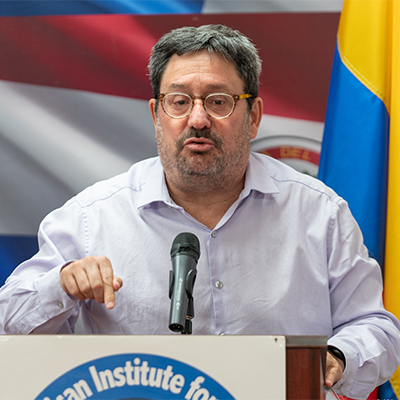Don't let your guard down

By: Francisco Santos - 02/06/2025
Share:
President Gustavo Petro has accustomed us to throwing stones and hiding his hand. We went from "I didn't raise him" to his right-hand man, the corrupt Minister of the Interior, Armando Benedetti, saying "neither the national government nor any of us can call strikes." He forgot the speech at the so-called open town hall meeting in Barranquilla, where Petro clearly proposed this national strike.
This show of force went badly, very badly, for Petro and his allies. Could it be that they didn't have the money for buses, lunches, and the payment of attendees for the demonstrations, as happened in Barranquilla, where they had to gather people from every corner of the city to fill the event? It doesn't matter. The truth is that Petro's exhaustion is due to the fact that in almost three years of government, he hasn't built a single project and has nothing to show for it. Or maybe, as the song says, "words, words, words."
The warehouses reach a point where citizens feel the insecurity firsthand. Students feel their aid dwindling or their credit costs rising. The humble worker who wants to buy a home sees the cost of their subsidies rising or running out. Three examples. The Ministry of Sports' budget went from 882 billion to 463 billion. The Icetex budget went from 5.6 trillion to 3.6 trillion. Regarding housing subsidies, they eliminated the interest rate coverage—5 percent for VIS and 4 percent for VIP—which helped the poor pay off their loans. As if this weren't enough, in December 2024 they suspended the program due to lack of resources and in March 2025 they reactivated it with 803 subsidies. Yes, 803; that's the Government of Change.
This lack of credibility, in which the president and his government have nothing to show for it, took its toll this past Wednesday and Thursday. However, the narrative remains powerful, and Petro's paid friends and his radical left are there, ready to defend their business and their income. We cannot rule out that, in his infinite arrogance, and with some help from stimulants, he will once again call on his Socialist Workers' Party (SS) to block streets and highways, repeating what happened in 2021, when they managed to paralyze the country. As citizens, we must not let our guard down against this possibility.
However, we must now start thinking about the other alternative: the 2026 elections. Not as the parties, the dozens of pre-candidates currently running—plus those yet to enter the fray—and their funders, many of them highly-recognized businessmen, are doing today. No, we must develop a much broader strategy than just supporting candidates to see who wins.
First, we must understand the discontent that brought Petro to power and thoroughly analyze the soft Petrism that exists, which has valid grievances and calls for a future. Hundreds of thousands of families managed to send their child or children to university, only to find no work when they graduate. What can we tell them? What can we offer them? There are many issues like this that we cannot ignore. Addressing this lack of knowledge is essential to having a country with a future. Otherwise, in five years we could be back to the same old thing. Let's not look at the short term, the 2026 elections, let's look at the root of the problem. Petro was a symptom.
Second, we must make a great effort to massively mobilize Colombians abroad. There are 900,000 registered Colombians, and only 190,000 voted in the 2022 runoff. If we add the Colombians who have emigrated, the vote count could easily reach 2 million, of which 70 percent don't fall into these populist whims, as was the result for Hernández and Petro. We have forgotten those millions of votes, and we shouldn't. A good place to invest instead of wasting money, for now, on candidates, dear businessmen.
Third, we must mount extensive protection for the 2026 elections, not so much on election day, which must be done anyway, but beforehand with vote buying. People must be mobilized to infiltrate these spaces where vote buying is taking place; they are not difficult to locate. We must conduct massive digital campaigns asking people to record videos where this happens. Social media is the number one enemy of this practice, and we need an army of citizens defending the electoral process in all its aspects.
Fourth, sell hope and propose realistic solutions to the problems we identify when we analyze soft Petrism. It's not Mafe Carrascal or Margarita Rosa de Francisco who we need to address; it's the unemployed student, the roadless farmer, the small business owner—the Colombia that Uribe knew how to identify, how to listen to, and how to serve.
The next government can't fall into the same trap as Santos, Duque, and Petro: governments disconnected from the public but closely connected to the media through propaganda or drug dealing. Let's wait until we get there, but for now, we can breathe a little easier. But don't let your guard down for a second until 3:00 p.m. on August 7, 2026, because anything can be expected from Petro.
«The opinions published herein are the sole responsibility of its author».